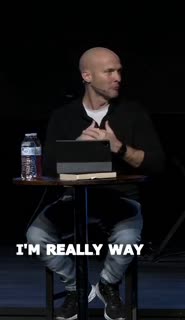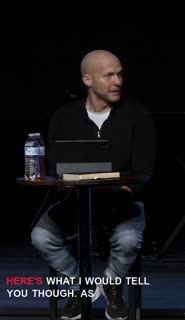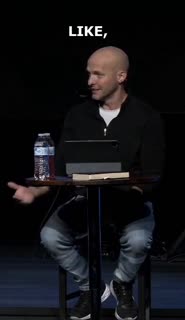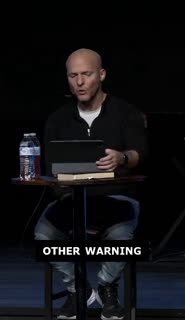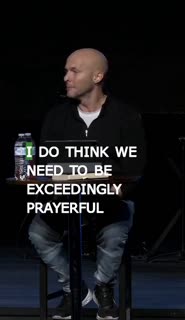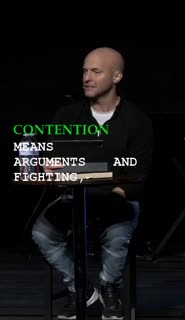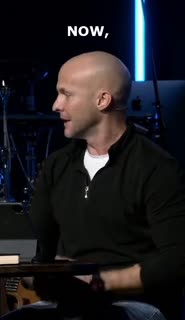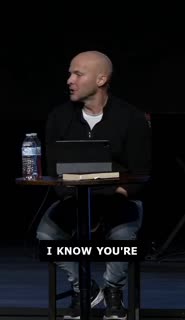Aligning Faith with Politics: A Call to Prayer
Devotional
Sermon Summary
Bible Study Guide
Sermon Clips
1. "I'm really way more concerned about not so much Tuesday's election. For those who are listening, maybe in the future, we are the weekend before the 2024 election. I'm less concerned about what you're going to do then because I'm guessing most of you know, if you're going to do anything or you've already done anything, you already know what you're going to do. What I want to do is I want to influence perhaps with God's word, the coming four years, because it's true. This is going to be more elections. If you and I stay alive, we're going to be around a little bit longer. And while the election will end, perhaps the political turmoil will not." [00:00:44] (32 seconds)
2. "Here's what I would tell you though. As a pastor, I'm asked by Jesus to teach God's word pretty much on every part of life. So if you're married, I'm supposed to teach God's word on marriage, on parenting, on what to do as a business person, on what to do in the home, what to do with just about anything. And as I'm thinking this through, I'm like, why do we leave politics out of that? Like, does Jesus not have lordship over everything?" [00:02:17] (24 seconds)
3. "Like, dude, we just need to know God's word in every area of life. So that's my heart. That's what I'm trying to do here. I want to encourage you. I'll bet you there's something, even though I might say something that makes you mad, there's probably also something that might be genuinely God for you today. And even if 90 % of it isn't, please be open for the 10 % that might be. Because what we're going to try to do is we're going to try to fine tune our brains. It's really true that as we grow up in all things into Christ, one of the things that should be shifting is we should be increasingly thinking God's thoughts after him." [00:03:07] (31 seconds)
4. "There's one other warning that we're going to take from the scriptures, and that is, Christian, if you really trust Jesus, and you may not, okay? So you are just like, what do these Christians think? This is going to be a hard message maybe for you to really get your arms around, because it's from the Bible, and it's from a people that are exalting the Bible as the highest standard, and the thing that we have to obey. So if you're not there, just kind of roll with me. At least you'll have a good education on the way Christians are trying to think about this. But Christian, if you're a Christian, the truth is there should be a radical difference between how you act in a political climate and how everybody else acts." [00:05:27] (37 seconds)
5. "I do think we need to be exceedingly prayerful about not only what happens, but about our steps and the people that we're around as we do it. And finally, I think we need to seek the good of the land that we're in. And that's what we're gonna see. Let's start with 1 Timothy 2, verses one through eight. So Paul is talking to Timothy and he knows Timothy's gonna pass on this letter to others and he knows Timothy's going to instruct his church and he wants to make sure in the church, they've got a lot of secular authorities. And he says, guys, I wanna make sure that you relate rightly to your secular authorities. I wanna make sure even though you're persecuted, even though you know very much you're in exile here, you're not like at home here in this world, even so you've been given secular authorities and I don't want you to just forget about them. I want you to remember them." [00:06:23] (47 seconds)
6. "Contention means arguments and fighting, especially over the law. Contention means over beliefs and that kind of thing. I want the men in every place to pray, lifting up holy hands without wrath and dissension. Let's just pull these apart a little bit at a time. I want the men. That doesn't mean he doesn't want the ladies, but men, sometimes we're challenged. Hey, dude, you're supposed to lead. You're supposed to lead your family. You're supposed to lead in spiritual things, and men want to be tough, and men want to be strong. Men maybe want the position, and God says, whatever you do, men, first of all, pray." [00:09:42] (29 seconds)
7. "I really think most of the time Jesus would say, don't opt out, guys. Don't opt out of the land that I put you in. You can make it better, but you've got to go after it for the decades that are going to follow you. You can renew your mind. You can keep growing. You can keep growing and keep making things better. Now, some are going to say, but Carter, what if, okay, what if there's actually good things I want to happen, but the person that would usher that in is super mean, sometimes funny, sometimes a bully, sometimes yelling." [00:21:28] (32 seconds)
8. "Here's what I would encourage you, what I feel like is a good biblical idea. Policy over personality. Policy over personality. Because here's why. I don't get to vote for the person I would pick. And you don't either. Have you noticed that? Like, it doesn't matter what you wish. I wish different things too. I wish Craig Rochelle could be president of the United States. I'd totally vote for him. He'd be my pick for sure. Like, I'd pick him. Here's the problem. He's not running." [00:22:44] (27 seconds)
9. "Now, some of us, I'm just going to, I'm going to meddle for a second. Now, you're my family, okay? So, we're at the family dinner table, not picking on anybody. I'm just going to give you some thoughts because I think they're saved thoughts. There's a real thing that I think is, whether it's Trump or Harris, it's Trump derangement syndrome or Harris derangement syndrome, meaning it is so emotional that it can't quite think straight. You're so hating this person that you can't quite think straight. But I think there's another side to it, and I think we need to look at it. And we could call it Trump idolatry syndrome or Harris idolatry syndrome. Check it out." [00:23:31] (38 seconds)
10. "I know you're going into a holiday season. I know you're going to see some people. I know you're going into this coming Tuesday and you're going to have feelings. And I'm not asking you to not have very provoked feelings about things, but I'm asking, can we, can we just reflect for a moment and say, what if as I interact with people, as I see old girl on TV, instead of being like venom in my throat, instead say, I'm going to try to think of something good about her. Or if I see old boy, I'm going to try to think of something good about him. I'm going to try to be gracious with the people that I'm around. I'm going to be going to turn off just only slander." [00:36:41] (35 seconds)
Ask a question about this sermon
2. "Here's what I would tell you though. As a pastor, I'm asked by Jesus to teach God's word pretty much on every part of life. So if you're married, I'm supposed to teach God's word on marriage, on parenting, on what to do as a business person, on what to do in the home, what to do with just about anything. And as I'm thinking this through, I'm like, why do we leave politics out of that? Like, does Jesus not have lordship over everything?" [00:02:17] (24 seconds)
3. "Like, dude, we just need to know God's word in every area of life. So that's my heart. That's what I'm trying to do here. I want to encourage you. I'll bet you there's something, even though I might say something that makes you mad, there's probably also something that might be genuinely God for you today. And even if 90 % of it isn't, please be open for the 10 % that might be. Because what we're going to try to do is we're going to try to fine tune our brains. It's really true that as we grow up in all things into Christ, one of the things that should be shifting is we should be increasingly thinking God's thoughts after him." [00:03:07] (31 seconds)
4. "There's one other warning that we're going to take from the scriptures, and that is, Christian, if you really trust Jesus, and you may not, okay? So you are just like, what do these Christians think? This is going to be a hard message maybe for you to really get your arms around, because it's from the Bible, and it's from a people that are exalting the Bible as the highest standard, and the thing that we have to obey. So if you're not there, just kind of roll with me. At least you'll have a good education on the way Christians are trying to think about this. But Christian, if you're a Christian, the truth is there should be a radical difference between how you act in a political climate and how everybody else acts." [00:05:27] (37 seconds)
5. "I do think we need to be exceedingly prayerful about not only what happens, but about our steps and the people that we're around as we do it. And finally, I think we need to seek the good of the land that we're in. And that's what we're gonna see. Let's start with 1 Timothy 2, verses one through eight. So Paul is talking to Timothy and he knows Timothy's gonna pass on this letter to others and he knows Timothy's going to instruct his church and he wants to make sure in the church, they've got a lot of secular authorities. And he says, guys, I wanna make sure that you relate rightly to your secular authorities. I wanna make sure even though you're persecuted, even though you know very much you're in exile here, you're not like at home here in this world, even so you've been given secular authorities and I don't want you to just forget about them. I want you to remember them." [00:06:23] (47 seconds)
6. "Contention means arguments and fighting, especially over the law. Contention means over beliefs and that kind of thing. I want the men in every place to pray, lifting up holy hands without wrath and dissension. Let's just pull these apart a little bit at a time. I want the men. That doesn't mean he doesn't want the ladies, but men, sometimes we're challenged. Hey, dude, you're supposed to lead. You're supposed to lead your family. You're supposed to lead in spiritual things, and men want to be tough, and men want to be strong. Men maybe want the position, and God says, whatever you do, men, first of all, pray." [00:09:42] (29 seconds)
7. "I really think most of the time Jesus would say, don't opt out, guys. Don't opt out of the land that I put you in. You can make it better, but you've got to go after it for the decades that are going to follow you. You can renew your mind. You can keep growing. You can keep growing and keep making things better. Now, some are going to say, but Carter, what if, okay, what if there's actually good things I want to happen, but the person that would usher that in is super mean, sometimes funny, sometimes a bully, sometimes yelling." [00:21:28] (32 seconds)
8. "Here's what I would encourage you, what I feel like is a good biblical idea. Policy over personality. Policy over personality. Because here's why. I don't get to vote for the person I would pick. And you don't either. Have you noticed that? Like, it doesn't matter what you wish. I wish different things too. I wish Craig Rochelle could be president of the United States. I'd totally vote for him. He'd be my pick for sure. Like, I'd pick him. Here's the problem. He's not running." [00:22:44] (27 seconds)
9. "Now, some of us, I'm just going to, I'm going to meddle for a second. Now, you're my family, okay? So, we're at the family dinner table, not picking on anybody. I'm just going to give you some thoughts because I think they're saved thoughts. There's a real thing that I think is, whether it's Trump or Harris, it's Trump derangement syndrome or Harris derangement syndrome, meaning it is so emotional that it can't quite think straight. You're so hating this person that you can't quite think straight. But I think there's another side to it, and I think we need to look at it. And we could call it Trump idolatry syndrome or Harris idolatry syndrome. Check it out." [00:23:31] (38 seconds)
10. "I know you're going into a holiday season. I know you're going to see some people. I know you're going into this coming Tuesday and you're going to have feelings. And I'm not asking you to not have very provoked feelings about things, but I'm asking, can we, can we just reflect for a moment and say, what if as I interact with people, as I see old girl on TV, instead of being like venom in my throat, instead say, I'm going to try to think of something good about her. Or if I see old boy, I'm going to try to think of something good about him. I'm going to try to be gracious with the people that I'm around. I'm going to be going to turn off just only slander." [00:36:41] (35 seconds)
